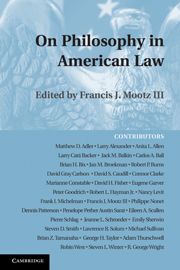Book contents
- Frontmatter
- Contents
- Introduction
- PART I KARL LLEWELLYN AND THE COURSE OF PHILOSOPHY IN AMERICAN LAW
- PART II PHILOSOPHICAL PERSPECTIVES ON LAW
- 7 Toward Normative Jurisprudence
- 8 Critical Legal Theory Today
- 9 Reviving the Subject of Law
- 10 Law and Creativity
- 11 The Stories of American Law
- PART III AREAS OF PHILOSOPHY AND THEIR RELATIONSHIP TO LAW
- PART IV PHILOSOPHICAL EXAMINATIONS OF LEGAL ISSUES
- PART V LAW, RHETORIC, AND PRACTICE THEORY
- PART VI QUESTIONING THE RELATIONSHIP BETWEEN PHILOSOPHY AND AMERICAN LAW
- PART VII COMMENTARIES
- Contributors and Selected Bibliography
- Name Index
- References
7 - Toward Normative Jurisprudence
Published online by Cambridge University Press: 31 July 2009
- Frontmatter
- Contents
- Introduction
- PART I KARL LLEWELLYN AND THE COURSE OF PHILOSOPHY IN AMERICAN LAW
- PART II PHILOSOPHICAL PERSPECTIVES ON LAW
- 7 Toward Normative Jurisprudence
- 8 Critical Legal Theory Today
- 9 Reviving the Subject of Law
- 10 Law and Creativity
- 11 The Stories of American Law
- PART III AREAS OF PHILOSOPHY AND THEIR RELATIONSHIP TO LAW
- PART IV PHILOSOPHICAL EXAMINATIONS OF LEGAL ISSUES
- PART V LAW, RHETORIC, AND PRACTICE THEORY
- PART VI QUESTIONING THE RELATIONSHIP BETWEEN PHILOSOPHY AND AMERICAN LAW
- PART VII COMMENTARIES
- Contributors and Selected Bibliography
- Name Index
- References
Summary
Lawyers, judges, legal scholars, and law students – collectively, the legal profession – all, at various times, criticize, pan, praise, or laud laws. So, lawyers are inclined to say, in any number of formal and informal contexts, this law is a good law or a bad law, or this regulation is a godsend or a calamity; that piece of legislation is a breach of trust or an act of good faith; that legal regime, even, is a boom or a bust for mankind. How do we do that? What is it that lawyers know, if anything, about law, society, or political morality that informs their nonadversarial critical work? Somehow, the scholar, judge, American Law Institute committee member, legislator, or student reaches a judgment, decidedly moral, that a strict liability rule with respect to automobile accidents or defective products is better than a negligence regime, that the holder of a promissory note should take that note free of defenses on the basis of fraud in the underlying transaction, that a sexually harassed worker should have a cause of action under Title VII of the Civil Rights Act, and that the First Amendment should protect purveyors of hate speech no less than advocates of evolution or creation science against state censure. Knowledge of the law that exists, alone, cannot possibly generate the basis of our conclusions regarding the law that ought to be – although it is surely true, as countless scholars have pointed out now for the past one hundred years, that our judgments regarding the law that ought to be influence our understanding of the law that is.
- Type
- Chapter
- Information
- On Philosophy in American Law , pp. 55 - 63Publisher: Cambridge University PressPrint publication year: 2009
References
- 2
- Cited by

